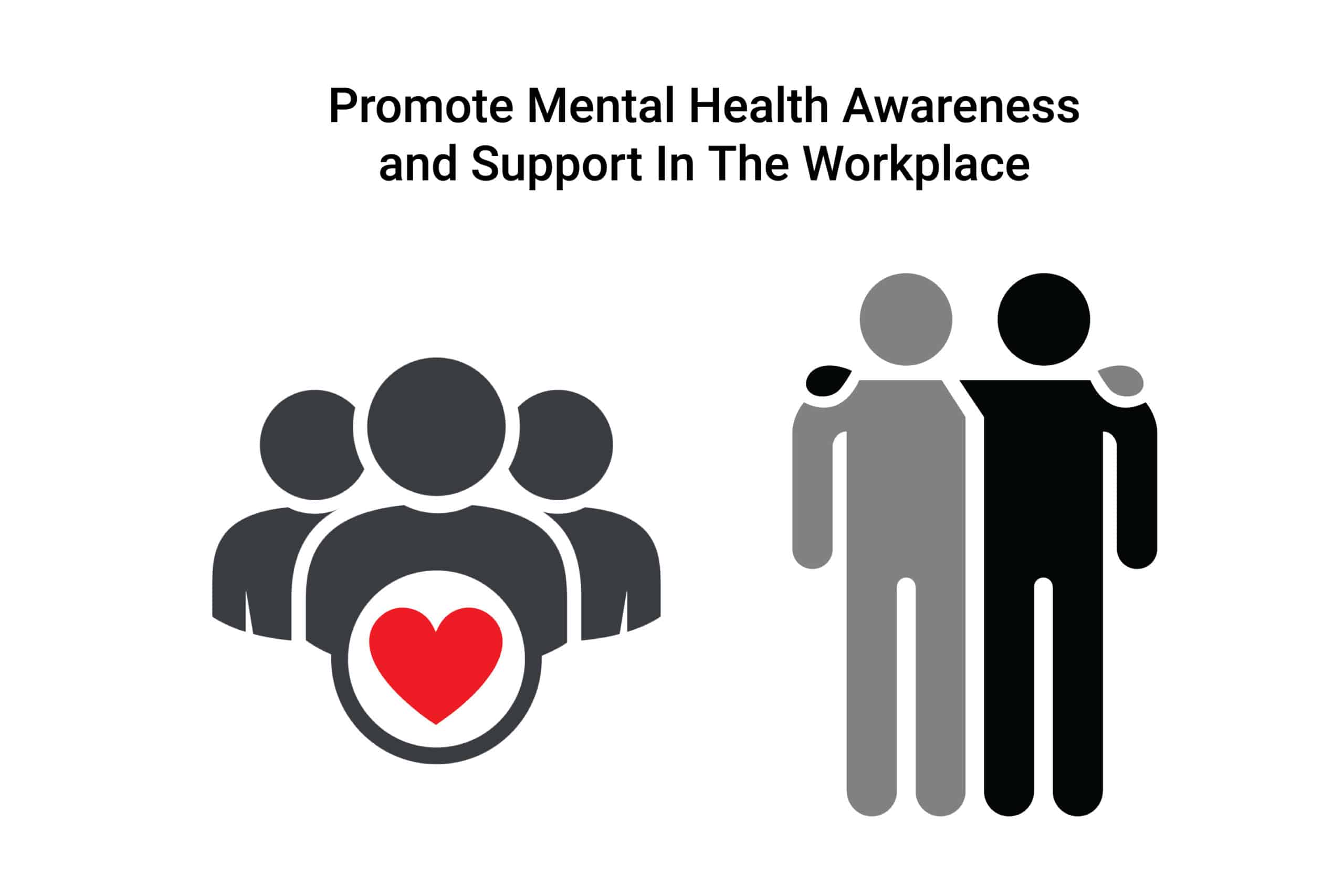
Taking care of our mental health is as crucial for our well-being as taking care of our physical health. A workplace culture that promotes awareness of mental health helps people who are experiencing difficulties to reach out for help when they need it.
Finding mental health support can be difficult and many people don’t recognise the symptoms of poor mental health or aren’t in an environment where they feel they can ask for help.
This short guide on how to find mental health support looks at common mental health issues, the signs of mental health problems and provides information on where to find help if needed.
Common Mental Health Issues at Work
A quarter of all workers in the UK will experience mental health issues at some point in their lives, according to the Health and Safety Executive (HSE). The mental health problems reported by UK workers include:
- Stress
- Depression
- Generalised anxiety disorder (GAD)
- Post-traumatic stress disorder (PTSD)
- Phobias
- Obsessive-compulsive disorder (OCD)
- Panic disorder
The number of people who reported that they were suffering from work-related depression, stress or anxiety increased during 2020/21, according to data gathered by the Labour Force Survey on self-reported work-related illness (SWI) and workplace injuries. This spike is due to the detrimental impact that the Covid-19 pandemic has had on people’s mental health.
It is important to recognise that mental health issues can be work-related, such as stress, or they may have outside causes, such as family or financial problems. The majority of people will experience a form of these problems at some point in their lives. With support and treatment, they can be overcome.
Some people may suffer from mental illnesses, such as:
- Antisocial personality disorder (ASPD)
- Borderline personality disorder (BPD)
- Bipolar disorder
- Psychotic disorders
These are serious conditions that may need ongoing specialised treatment including medication and/or hospitalisation.
Signs That Someone is Experiencing a Mental Health Problem
There are warning signs that may indicate a person is suffering with a mental health issue. Symptoms of a mental health problem can include:
- Sadness, listlessness and seeming disconnected from others
- Extreme mood swings
- Sudden outbursts of anger
- Lack of empathy or understanding for others
- Self-harm
- Withdrawing from friends and family
- Delusional thoughts
- Hallucinations
- Changes in eating behaviour
- Sleeplessness
- Feelings of extreme fatigue
- Increased risk-taking behaviour
When to Seek Mental Health Help Immediately
There are some mental health problems that need urgent attention. These include:
- Thoughts of suicide
- Extreme distress
- Panic attacks for no apparent reason
- Flashbacks to distressing events
- Feeling extremely confused
- Paranoia, or becoming very afraid about things that don’t exist
- Hearing voices
If you, or anyone you know, have these symptoms then it’s important to seek help immediately. In such an event you should go to any accident and emergency (A&E) department or call 999. If you know you need urgent help, but do not want to go to A&E you can also:
- Call Samaritans at 116 123
- Contact your GP for an emergency appointment
- Contact NHS 111 England or NHS Direct 0845 46 47 in Wales
- Call the National Suicide Prevention Lifeline on 800-273-8255
Remember, you are not alone – there is help available.
How to Find Mental Health Help
It’s important for your mental health, and of those you love, to talk about any issues you may be experiencing. Finding mental health help is not an easy, but reaching out to a friend or co-worker can be the first step towards getting the support and treatment needed.
If you, a colleague, a friend or a family member is in need of mental health support, the first person to seek help from is a GP. They can give a diagnosis and refer for further treatment from a therapist or a mental health support worker. They may also be able to recommend a support group for mental health.
Some people prefer to contact a trained therapist or counsellor. Assistance with locating a therapist can be found via the NHS programme called Improving Access to Psychological Therapies (IAPT) or through mental health charities and organisations such as Mind.
Children are often impacted by the mental health problems of their parents or may experience mental health issues of their own. The NHS and other organisations such as Young Minds also provide children’s mental health support services.
How to Provide Mental Health Support at Work
There are many ways in which employers and employees can work together to enhance mental health awareness and create a supportive workplace. Focusing on the following behaviours can help build a safer and more supportive working environment for everyone:
- Open communication – So that everyone can freely discuss their mental health troubles or concerns
- Increased awareness – Understanding that mental health issues are complex and different for everybody
- Respect – Having an unbiased and non-judgemental attitude towards mental health issues and mental health disorders
- Support – Not ignoring warning signs or problems and having ways to help when issues arise

Everyone in the workplace should commit to continuing to learn and understand mental health issues. Employers and employees should act together to look after themselves and their colleagues’ mental health by developing and encouraging better lifestyle habits. It is crucial to treat your work colleagues with respect and understand how your behaviour can affect others, both positively and negatively.
A focus should be placed on providing support and being open to conversations about mental health issues. It is never a good idea to ignore potential mental health problems, either in yourself, or in those around you. It is your duty to yourself, your employer, those around you and everyone that is close to you that you let them know when there is a problem.
By developing and implementing a mental health at work plan that encourages increased mental health awareness, employers can act to create a supportive workplace for employees with mental health issues. Safe, confidential spaces should be provided for employees to ask for help if they feel they require it. These and other suggestions for providing better mental health support at work can be found in the UK government’s ‘Thriving at Work’ report.
Further Resources for Developing Mental Health Support Systems at Work
Everyone should feel that they are supported and valued in the workplace. People who are experiencing mental health issues need to be able to speak out about their problems without fear of being stigmatised, ignored or diminished in any way.
Providing employees with mental health training creates awareness about the need for a positive, supportive work environment. Developing an understanding of the importance of maintaining good mental health, and encouraging open discussion of mental health problems, will help employees to feel safer and more confident at work.
The courses offered by Human Focus can help participants to better understand mental health issues and how to deal with them. Trainees can learn coping mechanisms to deal with stress, fatigue, the pressures of social media and more. These courses can be taken online in segments, so it is easy to fit training around work schedules. The Human Focus mental health courses are assured by reputable authorities such as the Royal Society for the Prevention of Accidents (RoSPA).


















































































































































































































































































































































































































































































































































































































































































































































